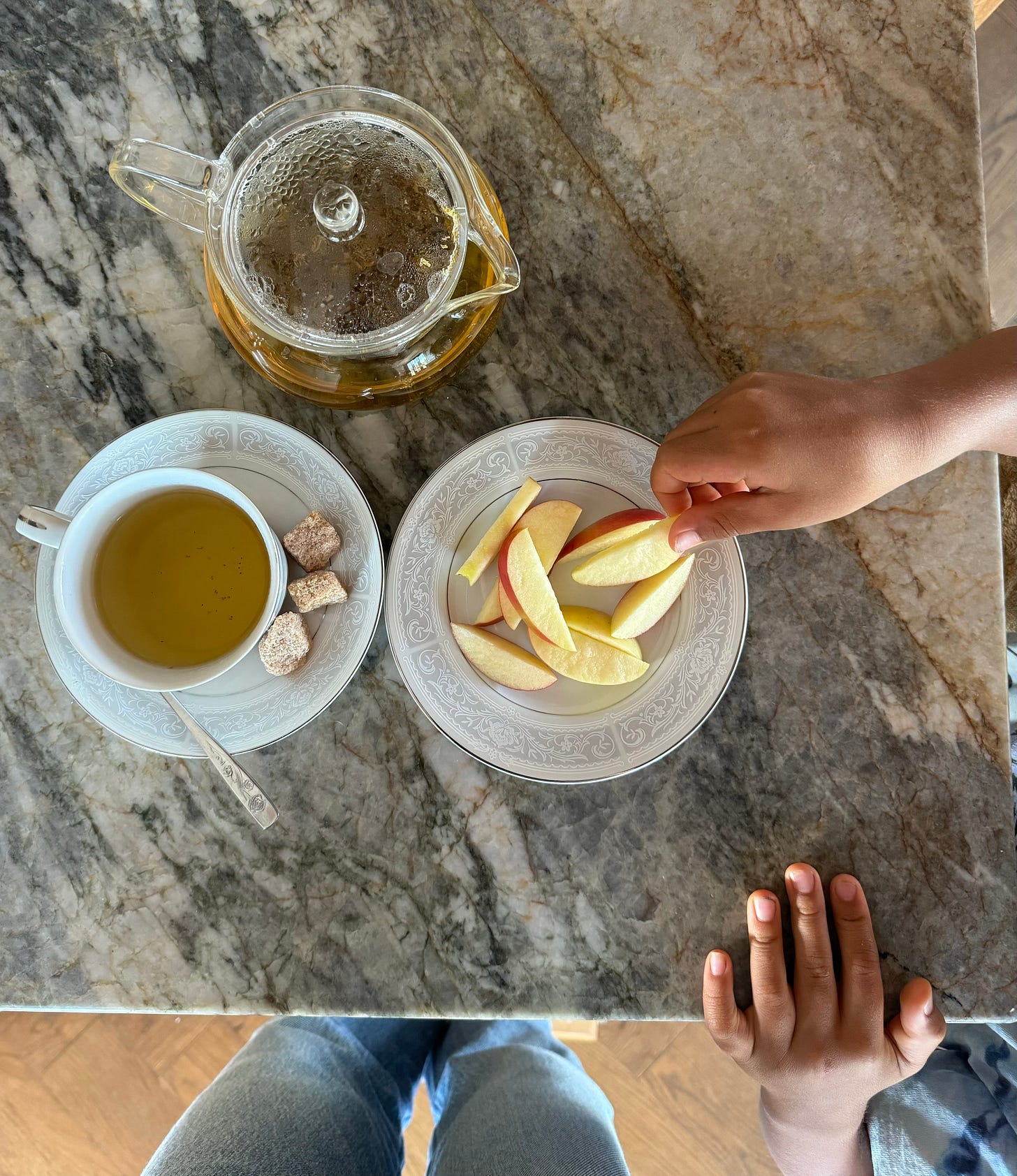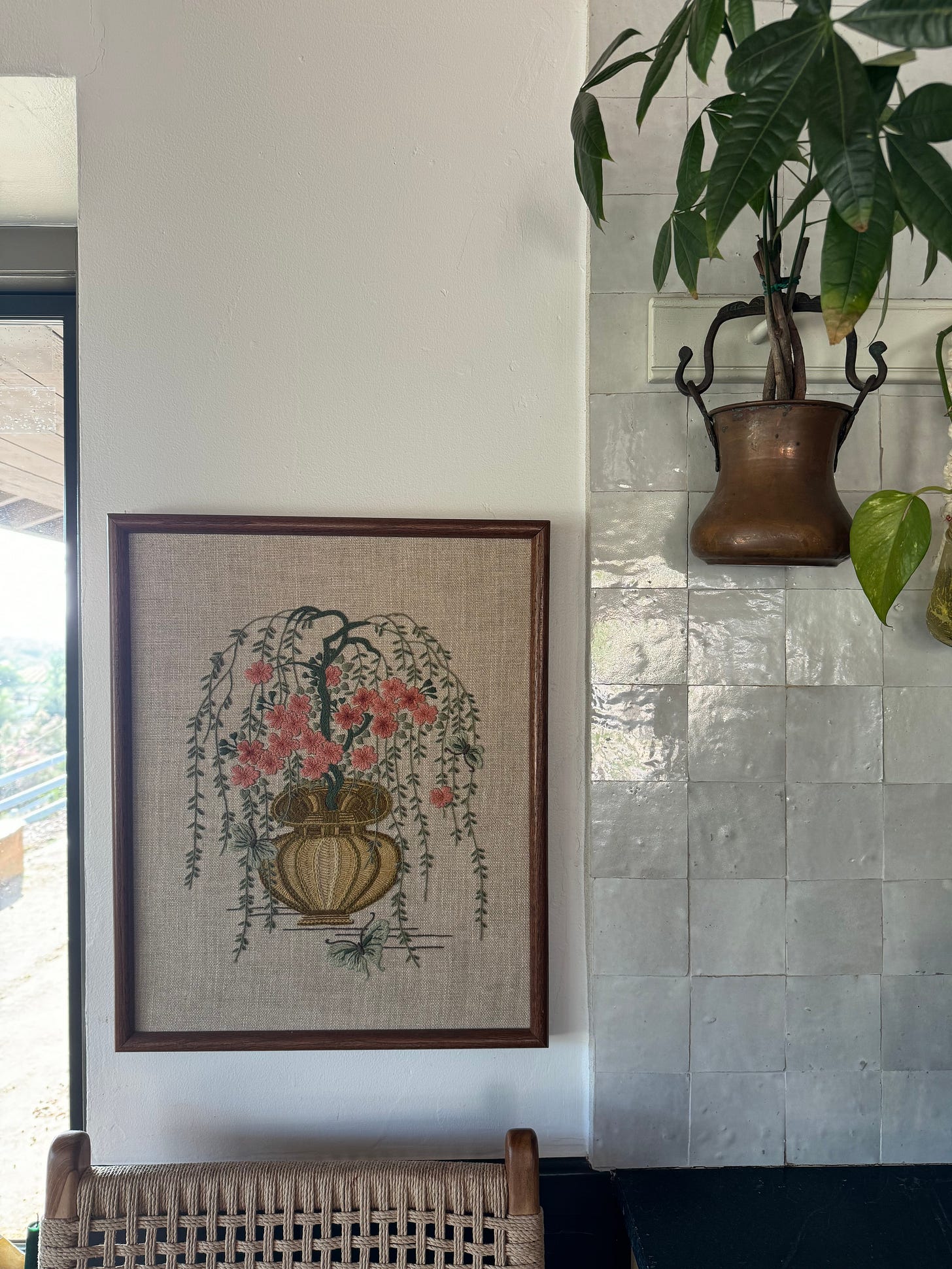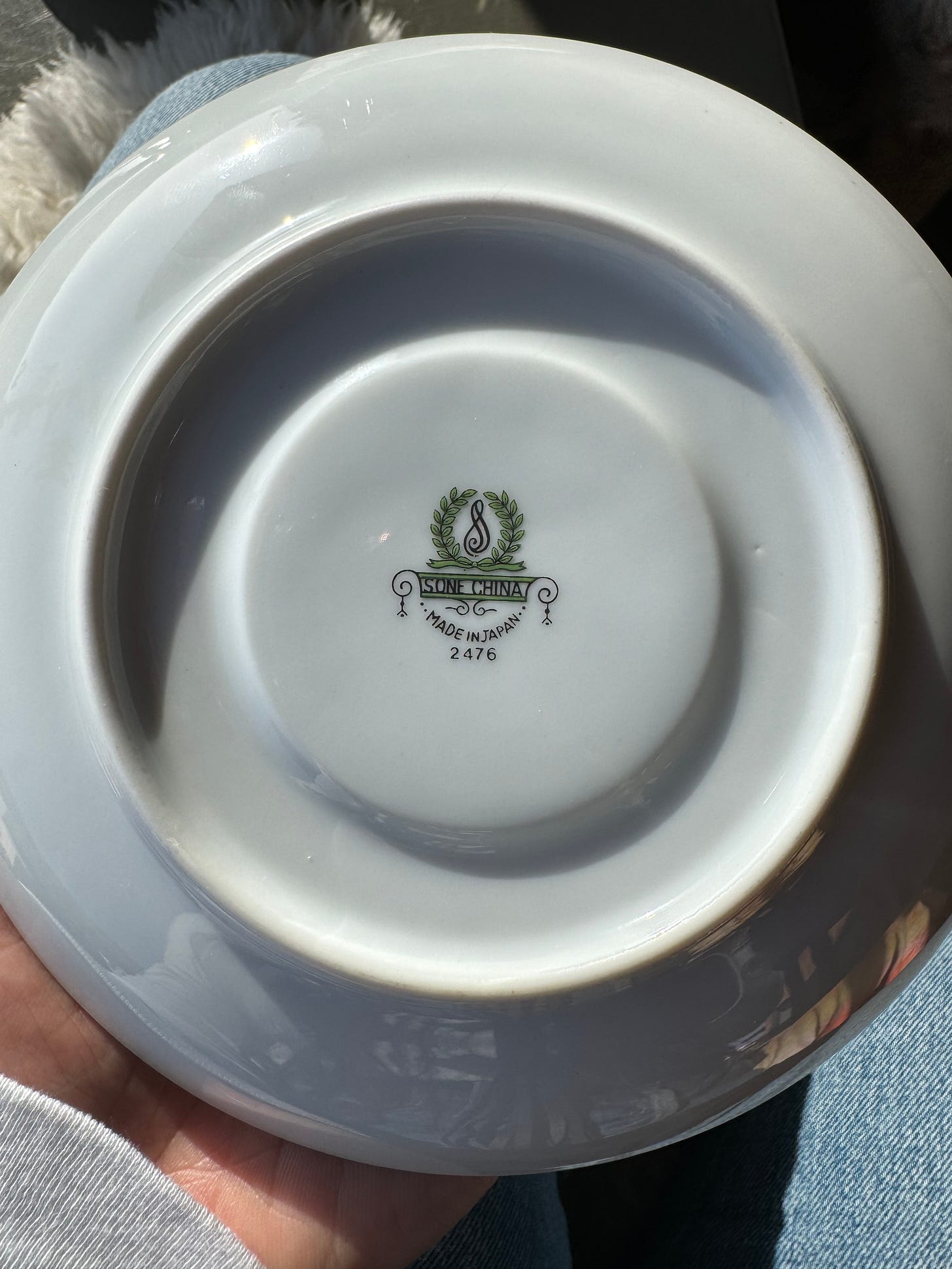How much weight do we give our things?
Swedish death cleaning + rethinking the meaning of our stuff + Q&A with Jenna Park, writer of Everything is Liminal
I pushed the back of my fork to pile onto my spoon: white rice, a vinegar-forward piece of mom’s chicken adobo, and her pungent and wrinkly long beans with its not-so secret ingredient, fish sauce. As a kid, I ate a meal like this often and, on a very specific plate. If you grew up in the 80s and 90s like me, there’s a good chance you’d remember the distinct pattern. It was this Corelle dish set with the Crazy Daisy print, the edge framed with green flowers, often seen on Pyrex dishes as well.
For me, these plates hold other memories.
I remember only washing them by hand because immigrants are convinced dishwashers are for lazy kids.
I remember setting them on a plastic lined table, to easier wipe off sticky rice from it after meals.
I remember placing the plates down, not knowing if Dad will join us for dinner even though he’s home; just another week he’s not speaking to us and too angry to join the table.
I remember Dad threw one of the plates at my mom in another one of their fights. I remember cleaning broken pieces of this plate from our floor.
My mom still has a couple of these plates left at her home. I considered asking to have them because I love how they look but I stopped myself.
These plates were the keepers of difficult memories.1
However, I did ask my mom for another set — our fancy dishes tucked in our hutch in the formal dining room, a room we never ate in, only for special occasions like Christmas and Thanksgiving. My dad got them while deployed in Japan. The white plates have a gray streak, with white floral details above it, the edges lined with silver.
I asked to inherit them and my mom was excited to get them off her hands. Maybe she has different memories with this dish ware. Did Dad throw one of these plates too? I don’t remember and I didn’t ask.
My daughter has a love for tea parties so we started using the cups and small plates sporadically. Over the last several months, we became too lazy to store them in our fancy dishes cupboard and now we use them daily.
The plates are a perfect size for a scrambled egg, sliced apples, or a muffin. It’s a solid receptacle to store tiny things, like pistachio shells or my son’s front tooth when it fell out this week.
If these heirlooms could talk, what would they say?
I keep wondering about my other family hand-me-downs. When they’re adults, will my kids want the piano they practice on, the same piano my sisters and I failed playing when we were kids? What about the embroidery hung up in my kitchen, a reminder that my mom somehow found time to stitch this as a full-time working mom?
I recently talked to a professional organizer and widow Julie Martella about The Weight of our Things — a clever title for her book, which gets into grief and the psychology of keeping our stuff. When a loved one dies, they leave behind more than memories. They leave rooms filled with possessions, full of emotional weight.
We talked about Swedish death cleaning, which is a ritual to rid the stuff you’ve accumulated that you don’t need or want anymore so that no one has to deal with it after you pass.
When a loved one is grieving, the last thing they want deal with is all your stuff, which won’t have the same meaning to them as it did for you.
There is merit to the Marie Kondo method, minimalism and all the talk about cutting out our crap but how much of us will actually get to it? And, if I don’t ever get to it, how will my kids know what was meaningful to me?
I thought about leaving a note, itemizing the top 10 objects that mean something to me or was passed down from family. As my kids or loved ones look through my things, they will know my story behind it. But that’s the key word. It’s MY story, or the story of another relative, not their own story. They can choose to keep the object and remember my version of the story, or build a new one of their own with it. Or, they may not want it at all.
Sentiment is so personal. Why did I want the fancy plates and my sisters didn’t? We all used them and begrudgingly hand-washed them but only one of us cared to bring them in our current home.
So now that we have my childhood fancy dishes at my house, I realized I ultimately can’t control my kids’ memories with this china either.
Memory is difficult and selective.
Will my kids grow up and want these dishes because they remembered tea parties where I let them put 3 sugar cubes into a single cup of tea? But what if, instead, they remember me crying in one of my depressive episodes while they ate a muffin off their plate? Or will these plates trigger memories of me yelling at them after I told them to put their plate away for the 3rd and final time!? Maybe in 30 years they won’t care a single bit about the dishes their grandfather they never knew got from Japan.
When I put it this way, it makes me rethink the meaning of my things. My sentiment doesn’t need to be the same as my loved ones’ sentiment. Our things bring weight to this present moment. How heavy does it feel to you and do you want to keep carrying it?
What memories do you have of your family heirlooms? Call your siblings or family members and ask them what they remember about the same objects. Were their memories similar or different than yours?
A special Q&A
One of my favorite writers on Substack is
, who writes Everything is Liminal. Her essays are deep and beautiful and her piece last week called Grief and joy can coexist hit very close to home for me.My father passed away in 2015 and my family had a complicated relationship with him. For me, watching him die was sad and it was a blessing. Jenna’s piece eloquently shares the struggle between conflicting emotions: “what I’m left with is my own reckoning of what I’ve had to tell myself for years in order to love him as a father—because I didn’t love him as a person.”
I asked her to answer the 3 questions we ask guests on my podcast, which I recently quit. I loved her responses so much because I can relate to much of it, including #3, as I unlearn my views on education and achievement as a kid of immigrants.
1) what's the baggage you are working to unpack? (emotional, mental, etc)
I’ve been unpacking emotional and childhood baggage for years—it very much is a life-long process! But I’ve only started facing it in earnest recently. This is partly why I decided to step back from my career a year ago. I was a workaholic and very much focused on my career as the family breadwinner, and I was not dealing with more recent family trauma that was just compounding on top of childhood trauma. It came at the expense of everything else in my life. I admitted to myself about a year ago that I wouldn’t be able to process any of it unless I made the space and time to really deal with it in a very intentional way. I think I was also using work as a way to distract myself from grief—and it works up until a certain point, but grief persists and it transforms over time. It’s pretty stereotypical of my Asian-ness to use work as an excuse to ignore mental health. I saw this first-hand with my brother to tragic ends. I didn’t want to perpetuate the modeling of this behavior to my children.
2) what or who inspires you?
Being in big nature that makes you feel small and reminds you that the world holds endless possibilities. Flowers. People who find an interest or cause that they are passionate about and dedicate their life’s work to. I don’t think I have found that in my life yet.
3) when did you f up (as a mom or as a human being) and what did you learn from it?
When my oldest child was about 10 or 11 years old, she looked me straight in the eye and challenged me with this: “what’s wrong with being average?” It had to do with a test or maybe it was a report card grade. I didn’t have a good answer because YES, what IS wrong with being average? I grew up as an Asian immigrant in NYC. Getting good grades was expected—not so much from my parents, surprisingly, but from my own internal pressures of what I interpreted as external stereotypical expectations. Raising children has really turned these ingrained immigrant values on its head. During my 20 years of parenting, I’ve had to personally challenge how I was perpetuating these Asian stereotypes through my children.
Plus, in a google search I just saw the daisy pattern tested insanely high in lead?!











Those dishes gave me the biggest deja-vu nostalgia hit! I think everyone had those dishes! And loved this post Stephanie. This is the second essay about death cleaning I've read this week! And it's so frequently on my mind. I did a huge purge cleaning last weekend. Lastly, thanks for the opportunity to do the QA ❤️
This is so good. We live in a small space and did a big clear, with a series of mini clears over the years. It seems like the less clutter physically the less clutter mentally for me anyway. Great piece